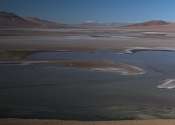Last update:
Astrobiology news

Researchers shed light on how key ingredient for life may form in space
A team led by University of Maryland chemists discovered a new way to create carbenes, a class of highly reactive yet notoriously short-lived and unstable molecules. Involved in many high-energy chemical reactions such as ...
Astrobiology
May 16, 2024
1
10

Scientists help unravel life's cosmic beginnings
Knowledge about the early forms of life in the universe that may have led to the development of life on Earth remains largely unknown. However, a group of scientists at the University of Hawaiʻi at Mānoa are attempting ...
Astrobiology
May 13, 2024
0
313

Discovery of biomarkers in space—conditions on Saturn's moon Enceladus simulated in the laboratory
In 2018, very large organic molecules were discovered in ice particles on Saturn's moon Enceladus. It is still unclear whether they indicate the existence of life or were created in some other way. A recent study could help ...
Astrobiology
May 13, 2024
0
92

Tracing the origins of organic matter in Martian sediments
Although Mars presents a barren, dusty landscape with no signs of life so far, its geological features such as deltas, lakebeds, and river valleys strongly suggest a past where water once flowed abundantly on its surface. ...
Astrobiology
May 13, 2024
0
283

What deadly Venus can tell us about life on other worlds
Even though Venus and Earth are so-called sister planets, they're as different as heaven and hell. Earth is a natural paradise where life has persevered under its azure skies despite multiple mass extinctions. On the other ...
Astrobiology
May 12, 2024
2
35

AI may be to blame for our failure to make contact with alien civilizations
Artificial intelligence (AI) has progressed at an astounding pace over the last few years. Some scientists are now looking towards the development of artificial superintelligence (ASI)—a form of AI that would not only surpass ...
Astrobiology
May 11, 2024
26
667

Astronomers are on the hunt for Dyson spheres
There's something poetic about humanity's attempt to detect other civilizations somewhere in the Milky Way's expanse. There's also something futile about it. But we're not going to stop. There's little doubt about that.
Astronomy
May 10, 2024
2
88

We need to consider conservation efforts on Mars, say researchers
Astrobiology is the field of science that studies the origins, evolution, distribution, and future of life in the universe. In practice, this means sending robotic missions beyond Earth to analyze the atmospheres, surfaces, ...
Astrobiology
May 10, 2024
0
34

Looking for life on Enceladus: What questions should we ask?
Does life exist beyond Earth? One of the most compelling places to consider this possibility is Enceladus, a moon of Saturn with a liquid water ocean encased in a frozen shell. There, plumes of water spray from ice fractures ...
Astrobiology
May 9, 2024
1
334

New study delves into ozone's influence on exoplanetary climate
In the quest for life beyond our solar system, a new study delves into the atmospheric dynamics of planet Proxima Centauri b, illuminating ozone's pivotal role in shaping planetary climates. This research signifies a significant ...
Astrobiology
May 8, 2024
0
28

What can early Earth teach us about the search for life?
Earth is the only life-supporting planet we know of, so it's tempting to use it as a standard in the search for life elsewhere. But the modern Earth can't serve as a basis for evaluating exoplanets and their potential to ...
Astrobiology
May 7, 2024
0
22

Webb telescope probably didn't find life on an exoplanet—yet
Recent reports of NASA's James Webb Space Telescope finding signs of life on a distant planet understandably sparked excitement. A new study challenges this finding, but also outlines how the telescope might verify the presence ...
Astrobiology
May 2, 2024
0
76

New findings point to an Earth-like environment on ancient Mars
A research team using the ChemCam instrument onboard NASA's Curiosity rover discovered higher-than-usual amounts of manganese in lakebed rocks within Gale Crater on Mars, which indicates that the sediments were formed in ...
Astrobiology
May 1, 2024
0
4682

Enceladus spills its guts through strike–slip motion
Over the course of its elliptical orbit, the moon Enceladus is squeezed unevenly by Saturn's gravitational pull and deforms from a spherical shape into a football shape and back again. This cyclic stress causes a phenomenon ...
Astrobiology
Apr 30, 2024
0
36

A NASA rover has reached a promising place to search for fossilized life on Mars
While we go about our daily lives on Earth, a nuclear-powered robot the size of a small car is trundling around Mars looking for fossils. Unlike its predecessor Curiosity, NASA's Perseverance rover is explicitly intended ...
Astrobiology
Apr 24, 2024
8
79

Will we know if TRAPPIST-1e has life?
The search for extrasolar planets is currently undergoing a seismic shift. With the deployment of the Kepler Space Telescope and the Transiting Exoplanet Survey Satellite (TESS), scientists discovered thousands of exoplanets, ...
Astrobiology
Apr 23, 2024
0
18

Why is methane seeping on Mars? NASA scientists have new ideas
The most surprising revelation from NASA's Curiosity Mars Rover—that methane is seeping from the surface of Gale Crater—has scientists scratching their heads.
Astrobiology
Apr 22, 2024
0
561

Look to deadly Venus to find life in the universe, new paper argues
Despite surface temperatures hot enough to melt lead, lava-spewing volcanoes, and puffy clouds of sulfuric acid, uninhabitable Venus offers vital lessons about the potential for life on other planets, a new paper argues.
Astrobiology
Apr 22, 2024
0
80

Crucial building blocks of life on Earth can more easily form in outer space, says new research
The origin of life on Earth is still enigmatic, but we are slowly unraveling the steps involved and the necessary ingredients. Scientists believe life arose in a primordial soup of organic chemicals and biomolecules on the ...
Astrobiology
Apr 21, 2024
1
1938

Unraveling water mysteries beyond Earth: Ground-penetrating radar will seek bodies of water on Jupiter
Finding water on distant planets and moons in our solar system is a challenge, especially when the instrument is thousands of kilometers away from the surface, but scientists presenting at the European Geosciences Union General ...
Astrobiology
Apr 19, 2024
1
98
More news

Is the universe really a 'dark forest' full of hostile aliens in hiding?

Could Earth life survive on a red dwarf planet?
Other news

Researchers realize multiphoton electron emission with non-classical light

Composition of gut microbiota could influence decision-making

Physicists propose path to faster, more flexible robots

Spiny legged 308-million-year-old arachnid discovered in the Mazon Creek locality

Furry thieves are running loose in a Maine forest, research shows

Scientists develop new geochemical 'fingerprint' to trace contaminants in fertilizer

Chemists develop new method for introducing fluorinated components into molecules

Ion irradiation offers promise for 2D material probing

NASA unveils design for message heading to Jupiter's moon Europa

Study finds the West is best to spot UFOs

























































